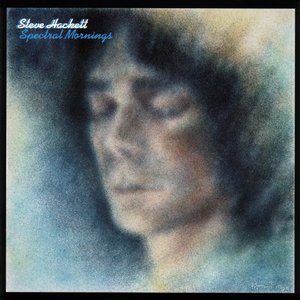Published on Mar 29, 1999
I sometimes wonder, “Why is it that at least fifty percent of
all great guitarists in Rock are named Steve?”. Steve Hackett from
Genesis, Steve Howe from Yes, Steve Anscombe from Protos (who?),
Steve Vai, the list seems endless. I was just pondering this
amazing coincidence, which struck me anew during my travels on the
murky waters of Usenet. Still … on to business.
Spectral Mornings counts as Hackett’s third solo album,
although some folks reckon his first,
Voyage Of The Acolyte, is a Genesis album in all but name.
It represents the output of a man who has, musically-speaking, come
out from under the shadow of the band that made his name (even if
his reputation as “the former Genesis guitarist” never left him).
The variety of styles represented, and the consummately sure touch
displayed, together present a mature talent and, along with his
second album,
Please Don’t Touch, the pinnacle of his solo work.
The lively, bounding “Every Day” kicks us off. The tune feels
catchy at first, but with introspective interludes giving the
listener to pause. The guitar work is exquisite, especially with
the later elaboration upon the initial theme. You clearly hear that
uniquely Hackett haunting quality, and it might be here that you
discover exactly what it is you loved about pre-1978 Genesis. A
closer examination of the lyrics betrays a sombre side to the track
– another Hackett trademark. I am given to understand that the song
concerns itself with the folly of drug abuse, but the message is
subtle.
The gentle “The Virgin And The Gypsy” follows. A sweetly lyrical
song with that gorgeously smooth synth-like guitar that is
unmistakably Hackett.
The instrumental, and distinctly oriental, “The Red Flower Of
Tachai Blooms Everywhere” presents itself next, and it is as
self-indulgent a piece as the length of its title suggests. The
track itself is mercifully short. It might appeal to some, but it
left me thinking “filler”. You want me to lie to you?
“Clocks – The Angel Of Mons” is another instrumental, with
fairly unrestrained guitar and driving drums interspersed with
ticking clocks. The drum solo seems a little unnecessary, but all
in all, an interesting song.
Hackett whimsy is evident in “The Ballad Of The Decomposing Man”
– according to the artist, it’s a George Formby parody, and I
believe him, millions wouldn’t. What listeners outside of the UK
make of it, I cannot imagine. I quite enjoy its “Music Hall”
quirkiness, which soon gives way to a bossa nova cum calypso type
silliness. The aside comments made by the vocalist, whose name I
haven’t yet identified, betray a wit entirely in keeping with the
utter tongue-in-cheekedness of this song. It’s all too silly for
serious fans of progressive rock, but who cares?
“Lost Time In Cordoba”, another instrumental, allows Hackett to
showcase his not inconsiderable acoustic guitar talents. A very
pleasant classical guitar track, complete with flute accompaniment,
if you like that sort of thing. Which I do – sort of.
Ominous growling noises introduce the rather strangely
constructed song, “Tigermoth”. Urgent, “in your face” guitar,
booming bass, drums and cymbals announce a vaguely sinister intent
that gives way to more abstract synth work. Back to guitar and
drums in reprise, and then into a poignantly-related tale of aerial
heroism from the First World War. Honestly. The lyrics are in
doggerel form, and yet inexplicably touching. I found myself
singing the verses at odd moments for weeks, and will doubtless be
doing so again after this review. The end of the track features two
acoustic guitars in counterpoint, together with (I believe) a
xylophone, or synth equivalent. If ever there were a track of three
completely incongruous parts, this is it. Still, it works for
me.
The final track is breathtaking. It is “Spectral Mornings” and
for me is one of the most perfect songs I have ever heard. Gorgeous
free-flowing electric guitar is set against rhythmic hi-hat cymbal,
and with organ and mellotron background. This track without fail
raises the hairs on my arms, and induces in me the sincere, if
unrealistic, desire to instantly learn the guitar in similar
fashion. Jaw-droppingly beautiful, listening to this song is the
shortest six and a half minutes I know how to spend. Does that make
sense?
Genesis survived the loss of the highly charismatic Peter
Gabriel after
The Lamb Lies Down On Broadway, against the expectations of
many, including my own. Strangely, it was the more introspective
talent of Hackett that Genesis has missed more keenly. Hackett’s
influence on the band was always readily apparent, but never more
so than in the quality of his solo work in the mid to late
70’s.
